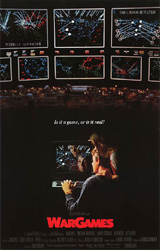 Synopsis: Is it a game, or is it real?
Synopsis: Is it a game, or is it real?
Matthew Broderick (Ferris Bueller’s Day Off) and Ally Sheedy (The Breakfast Club) star in this compelling drama filled with action, suspense and high-tech adventures! Featuring superb performances by Dabney Coleman and Barry Corbin, WarGames is “brilliant… funny… and provocative” (New York) – a fast-paced cyber-thriller.
Computer hacker David Lightmasn (Broderick) can bypass the most advanced security systems, break the most intricate secret codes and master even the most difficult computer games. But when he unwittingly taps into the Defense Department’s war computer, he initiates a confrontation of global proportions – World War III! Together with his girlfriend (Sheedy) and a wizardly computer genius (Tony Award winner John Wood), David must race against time to outwit his opponent… and prevent a nuclear Armageddon.
***********************************************************************
WarGames 7.75
eyelights: Matthew Broderick. Ally Sheedy. the basic premise.
eyesores: its simplistic look at the risks of automated defense systems. the dramatic but unlikely ending.
“Strange game. The only winning move is not to play.”
I came of age during the ’80s. Naturally, what that means is that I was exposed to the second wave of the Cold War, with mounting pressure being put on the U.S.A. and U.S.S.R. to chill the growing tensions between them. Although it paled in comparison to the first wave, which was utterly oppressive, we were nonetheless under constant threat of a potential nuclear attack and ensuing holocaust.
This naturally influenced the mass media, and my earliest recollections of the Cold War being reflected on the screen were ‘The Day After’, ‘Red Dawn’ and ‘WarGames’.
I still remember the impact (no pun intended) that ‘The Day After’ had. Pretty much everyone in my class had watched it, and those who hadn’t had to listen to us go on about it at length. Its nightmarish vision of North America, post-nuclear holocaust is imprinted on my memory for life. As for ‘Red Dawn’, our school arranged a screening in the gym (I guess they thought it might help us feel empowered).
I never saw it. I was pretty rebellious and hated to be imposed (yes, it was considered mandatory curricular activity) this screening on a stupid television in the gym. I figured that we wouldn’t be able to see or hear anything anyway, so what was the point? I was given the choice to clean my classmates’ desk instead. I agreed, if only to skip the screening, and got up to all sorts of mischief.
I only saw ‘WarGames’ a little later and was immediately taken with it. By then I was approximately the same age as Matthew Broderick’s character, David, was in the picture (for the record, Broderick was actually 20 at the time) and I liked the notion that a teenager was smart enough to hack into the school computer and change his grades. Like most kids, it was something I daydreamed of doing.
The rest of the story finds him trying to hack into a video game company’s system so that he can try out their latest game before it’s official release date – but inadvertently finding a military computer called WOPR instead. This computer, which is self-aware, was designed to playtest all sorts of wartime scenarios in order to minimize the casualties and damage that the United States would suffer.
The game David becomes most intrigued by is called “Global Thermonuclear War”.
What David doesn’t know, however, is that this simulation will raise alarms at NORAD because he and WOPR’s simulation would take over their defense monitoring stations, giving the illusion of an actual attack in progress. When the confusion is dispelled, they proceed to try to track David down. David, in a panic, tries to erase all connections with WOPR. But WPOR has other things in mind…
Although ‘WarGames’ is now dated by its technology (I love seeing Broderick us his dial-up phone to log onto a modem, b-t-w! Nice!), it nonetheless discusses an important question: the power that technology wields over us, how risky it can be to allow machines to make security decisions for us. This concept would soon translate in ‘The Terminator‘, which is far more extreme but equally disturbing.
While the latter would predict a future that we are only now barreling toward, “WarGames’ proposes a scenario that isn’t all too far-fetched: with hacking becoming a global threat, one can’t help but wonder how secure our military and government facilities are. Presumably, they aren’t be connected to the outside world, and thereby remain unhackable. But news reports regularly suggest otherwise.
One can only hope that the powers that be have indeed siloed our defense systems.
Besides bringing up concerns of national security and the dangers of automation and internet connectivity, ‘WarGames’ also tackles questions of mortality, hope for the future, the futility of war and the value of human life, amongst other things. While it doesn’t do so in any extensive fashion, at least these were put on the table, hopefully forcing some to consider matters they typically wouldn’t.
Naturally, most of the picture was designed as a ride, with David and his friend Jennifer (played by Ally Sheedy, who really would have been the best gf in the world, I’m sure) having to deal with the authorities and a countdown to extinction. It’s all highly implausible, especially the notion that it all hinges on a teenaged boy, but it’s exciting enough that one can partially ignore the ridiculousness.
In the end, ‘WarGames’ tackles serious concerns soberly enough that it is a superior picture to most of its Hollywood peers. Granted, it’s developed in a simplistic fashion and it doesn’t provide any real solutions, but it blends its crucial cautionary tale elements with the escapist fantasy function of a Hollywood blockbuster skillfully. From that perspective, ‘WarGames’ is still a winner.
Date of viewing: April 26, 2015